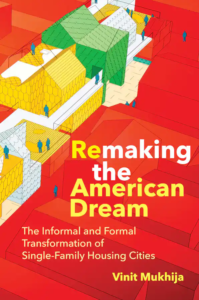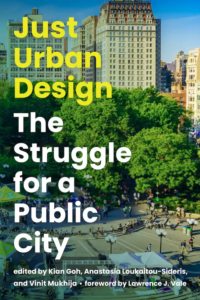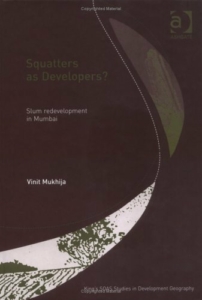Vinit Mukhija is a Professor of Urban Planning, the former Chair of the Department of Urban Planning, and has a courtesy appointment in Asian American Studies at UCLA. He is leading the Department of Urban Planning’s efforts to develop a new, one-year self-supporting graduate professional degree program in real estate development, which will situate real estate development pedagogy within a broader framework of politics, policy analysis, sustainability, and equity at the urban level.
Professor Mukhija’s research focuses on housing and the built environment. He is known for his scholarship on cities and the informal economy, affordable housing and urban design, and the redevelopment and upgrading of informal housing. It spans informal housing and slums in developing countries and “Third World-like” housing conditions (including colonias, unpermitted trailer parks, and illegal garage apartments) in the United States. He is particularly interested in understanding the nature and necessity of informal housing and strategies for upgrading and improving living conditions in unregulated housing. His work also examines how planners and urban designers in both the Global South and the Global North can learn from the everyday and informal city.
Professor Mukhija is interested in both spatial and institutional transformations. Initially, he focused on the Global South, particularly Mumbai, India, and demonstrated the value of slum-dwellers’ participation and input in housing interventions, including their contrarian support for the redevelopment of their slums. He published these findings in his first book, Squatters as Developers? (Ashgate 2003), which was reissued in paperback (Routledge 2017).
More recently, he has focused on informal housing and urbanism issues in the Global North, including unpermitted trailer parks, bootleg apartments, and garage conversions without permits. Most of this research is based on fieldwork in Los Angeles and surrounding areas. To draw attention to the growing prevalence and challenges of urban informality in the U.S., he co-edited a book, The Informal American City, with his colleague Anastasia Loukaitou-Sideris (MIT Press 2014). The book questions the conventional association of informal economic activities with developing countries and immigrant groups in developed countries. It also makes a case for a spatial understanding of urban informality. It includes Professor Mukhija’s chapter on the widespread prevalence of unpermitted second units on single-family-zoned lots in Los Angeles.
Along with colleagues Kian Goh and Loukaitou-Sideris, his recent edited book, Just Urban Design: The Struggle for a Public City (MIT Press, November 2022), presents the idea of inclusive urban life as a condition of justice and emphasizes the potential contributions of urban design to spatial justice through the “publicness” of cities. In a chapter on unpermitted secondary suites in Vancouver, which are surprisingly present in one-third of the city’s single-family houses because the built form of semi-basements makes adding informal units very easy, he examines how the units have been legalized with residents’ support, particularly Chinese Canadian and Indo-Canadian immigrants.
Professor Mukhija expanded his work in the two edited volumes on unpermitted second units into a new book, Remaking the American Dream: The Informal and Formal Transformation of Single-Family Housing Cities (MIT Press, 2022). He examines how the detached single-family home, which has long been the basic building block of most U.S. cities—not just suburbs—is changing in both the American psyche and the urban landscape. In defiance of long-held norms and standards, single-family housing is slowly but significantly transforming through incremental additions, unpermitted units, and gradual institutional reforms of once-rigid, local land use regulations. He argues that informal housing is vital in helping disadvantaged households access affordable housing and is not limited to immigrant communities from the Global South. Nonetheless, urban informality affects wealthy and less affluent families differently. Low-income and working-class residents, including immigrants, disproportionately bear the burdens of risky housing. The safe housing available on the formal market is unaffordable for the less fortunate, while affordable informal housing can often be dangerous.
Professor Mukhija trained as an urban planner (Ph.D., Massachusetts Institute of Technology), urban designer (MUD, University of Hong Kong), and architect (M.Arch., University of Texas, Austin, and B.Arch., the School of Planning and Architecture, New Delhi). He also has professional experience as an urban designer and physical planner in India, Hong Kong, and Kuwait, with new town design proposals and projects in India, China, and the Middle East. Before coming to UCLA, he worked as a post-doctoral researcher for the Fannie Mae Foundation in Washington, D.C., and developed neighborhood upgrading and renewal strategies for American cities. Some of his past projects have been funded by the Haynes Foundation, the California Policy Research Center, the Lincoln Institute of Land Policy, the United Nations Development Program (UNDP), and the World Bank.
Professor Mukhija has won multiple teaching awards at UCLA (2007, 2009, and 2013). His current teaching portfolio includes planning studios; “Introduction to Physical Planning,” a core course for students in the MURP program’s Design and Development area of concentration; “Informal City: Research and Regulation,” a seminar course that combines readings from the Global South and fieldwork-based case studies by students of informal economic activities in the Global North; and the “Comprehensive Project,” a group capstone option for MURP students. He recently taught the Comprehensive Project twice in partnership with Pacoima Beautiful (https://www.pacoimabeautiful.org/). The full and summary reports can be accessed here: https://knowledge.luskin.ucla.edu/2019/02/21/cnk-collaborates-on-transformative-climate-communities-effort/
Professor Mukhija has advised the Indian Institute of Human Settlements, Bangalore, on course and curriculum development. His other community and public service contributions include past membership on the Board of Directors of LA-Más, a Los Angeles-based urban design nonprofit organization; the Leadership Counsel for Justice and Accountability, a community organizing, research, legal representation, and policy advocacy nonprofit organization focused on California’s low income, rural regions; and the Los Angeles Area Neighborhood Initiative (LANI), a nonprofit organization focused on community-based urban revitalization strategies; serving as the Chair of the Global Planning Educators Interest Group (GPEIG) within the Association of Collegiate Schools of Planning (ACSP); and as current/past editorial advisory board member of the Journal of Planning Education and Research, the Global Built Environment Review, Architecture and Culture, and the Journal of the American Planning Association.
Books
 Mukhija, V., 2022, Remaking the American Dream: The Informal and Formal Transformation of Single-Family Housing Cities, MIT Press, Cambridge.
Mukhija, V., 2022, Remaking the American Dream: The Informal and Formal Transformation of Single-Family Housing Cities, MIT Press, Cambridge.
 Goh, K., A. Loukaitou-Sideris, and V. Mukhija, 2022, Just Urban Design: The Struggle for a Public City, MIT Press, Cambridge.
Goh, K., A. Loukaitou-Sideris, and V. Mukhija, 2022, Just Urban Design: The Struggle for a Public City, MIT Press, Cambridge.
 Mukhija, V. and A. Loukaitou-Sideris, 2014, The Informal American City: Beyond Taco Trucks and Day Labor, MIT Press, Cambridge.
Mukhija, V. and A. Loukaitou-Sideris, 2014, The Informal American City: Beyond Taco Trucks and Day Labor, MIT Press, Cambridge.




